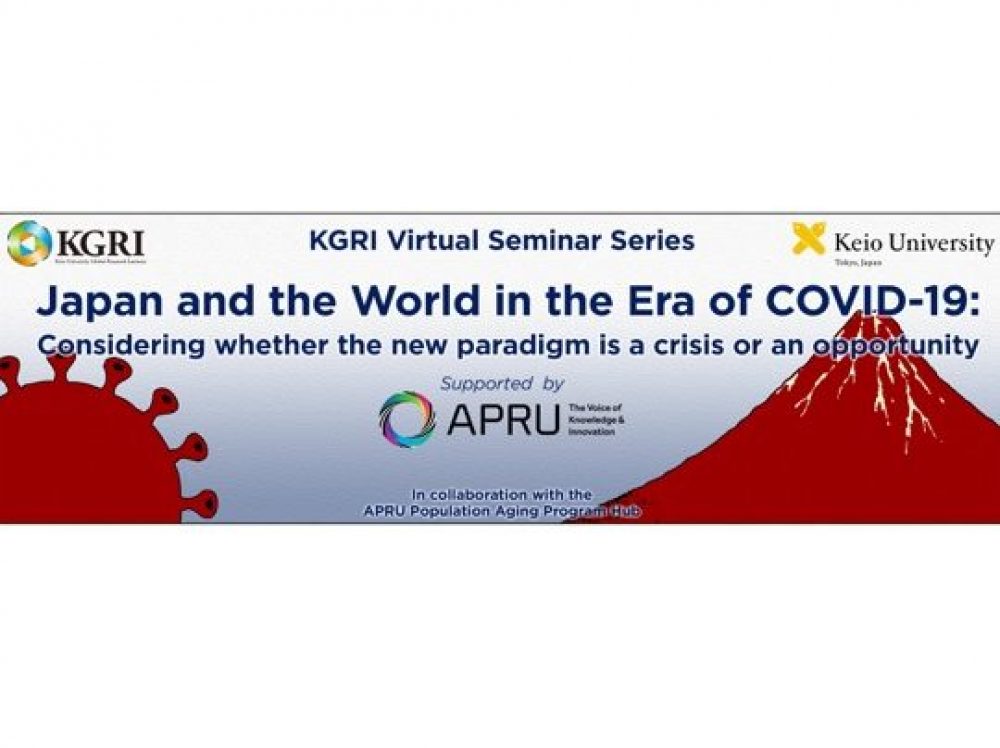We are delighted to note an online seminar (webinar) series at which Hiroki Nakatani, the APRU Population Aging Program Director and Project Professor, Keio University Global Research Institute (KGRI), brought together academics, practitioners and policy-makers to provide an intriguing overview of Japan in the midst of the COVID-19 pandemic and to gather proposals for key actions that need to be undertaken in preparation for a second wave.
The four live webinars, under the collective title of “Japan and the World in the Era of COVID-19: Considering whether the new paradigm is a crisis or an opportunity,” were held between June 17 and July 29. The first three webinars focused respectively on Health and Science & Technology; Economy and Work; and Society and Law.
A special presentation titled “Infectious disease emergency preparedness and response: Japan’s challenges seen from COVID-19” by H.E Senator Keizo Takemi, Member, House of Councillors, National Diet of Japan kicked off the fourth webinar.
A panel discussion which followed again saw the participation of H.E Senator Keizo Takemi, who was joined by Takeshi Kasai, Regional Director of the WHO Western Pacific Region; Hideyuki Okano, Professor, School of Medicine, Keio University/Senior Researcher, KGRI; and Sachiko Kazekami, Associate Professor, Faculty of Business and Commerce, Keio University. This panel, under the moderation of Ryoji Noritake, CEO and Board Member, Health and Global Policy Institute, analysed the broad range of effects the virus has had from multiple perspectives, such as health science, technology, economy, work, geopolitical change, and law.
The panellists examined Japan’s response to the first wave of COVID-19 infections, identifying vulnerabilities in the informational infrastructure as well as delays in innovations and their social application. The panellists also described current measures and proposed specific policies which should be introduced in the forthcoming six months.
While discussing steps towards the suppression of COVID-19, Professor Okano emphasized the power of health science, and gave an overview of the “Keio” model as a flexible means of countering infectious diseases, as well as speaking on the university’s endeavours to develop a COVID-19 vaccine. He also added that: “[It has been pointed out that new pandemics may be triggered more frequently due to outbreaks of new zoonosis caused by ecological, behavioural or socioeconomic changes but also the spread of new pathogens that had previously been isolated in the permafrost of Siberia and Switzerland, which is now melting due to global warming]. we need to establish efficient methodologies to develop diagnostic, therapeutic and prophylactic methods; suppression of COVID-19 will be an excellent lesson to prevent us from future pandemics caused by new pathogens.”
During the closing remarks, Professor Masato Yasui, Director, KGRI, stressed that “COVID-19 has wide implications for all aspects of humanity and society and is not a mere health issue. We need a cross cutting approach, and it is imperative that such multi-sectorial work be intensely promoted. KGRI is ready to expand such activities.”
The entire series was presented in Japanese, with panellists answering pre-selected questions from the audience. A live wrap-up discussion was then held in English, and Keio University subsequently re-recorded most of the talks in English to share with wider audience.
Keio University is a highly-valued member of the APRU network. Its Global Research Institute (KGRI) has coordinated many APRU activities and projects, including the APRU Population Aging program. Keio’s Vice-President, Professor Jiro Kokuryo, served for two APRU projects, as an academic coordinator for the AI for Everyone and an academic lead for the AI for Social Good.

